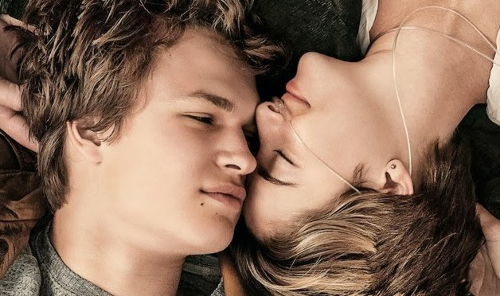I know, I know, you are tired of hearing about Manic Pixie Dream Girls. We feminist critics, we’re always Manic Pixie This, Bechdel Test That, Sexual Objectification of the Other Thing. And I’m tired of hearing about Manic Pixies too, but I’m even more tired of seeing them.

So tired, that when the elusive Manic Pixie Dream Boy appeared on my seatback video player on the long trip back to Cape Town last week, I was so annoyed by him I almost had to turn off The Fault in Our Stars even though I had 12 hours of flight time to fill.
TFiOS’s Augustus Waters is so much of a Manic Pixie he appears on the Wikipedia page for the concept. He’s handsome, “charming,” aggressively quirky. He fully embraces life’s glorious mysteries, he’s completely devoted (for reasons we don’t need to worry about) to the protagonist, and to making her also embrace life’s glorious mysteries (including his boners). He calls her by her first and middle names, Hazel Grace, because of course he does.

John Green, author of the YA novel the film is based on, responds that he was trying to make Gus the kind of character who seems perfect until you realize his whole life is a performance: (this quotation is from a weird podcast over soccer video game playing, so it’s edited down quite a bit):
I don’t think that Gus is really very much like those characters at all. I mean certainly he starts out I think as, you know, as most romantic leads do… like very sort of improbably charming and precocious and quick on his feet…to seem cooler than cool, you know.
I think in a lot of ways Gus is one of those guys who like, the first time you meet him you’re like “that guy’s amazing” and then the second time you meet him you’re like “that guy only has five funny stories about himself” those people who are sort of very performed in their lives… they have those performative qualities but… their charisma is… somewhat superficial and certainly that’s the case with Gus.
This character actually sounds really interesting, if not totally original (I immediately thought of Justin Theroux’s character on Parks and Recreation). And I haven’t read the book, so I don’t know if these nuances came across in the text, but in the film adaptation, it’s clear they stopped at “cooler than cool” with their characterization of Gus.

And boy, was I ever irritated with him. He’s the human equivalent of scraping your teeth on a popsicle stick. Everything he does is put-on nonsense he’ll defend in a wordy speech delivered through a perma-smerk. For example: he likes putting unlit cigarettes in his mouth as a “metaphor”: “you put the killing thing right between your teeth, but you don’t give it the power to do its killing.” Ohhhhhkay buddy.
He’s also from the “Pushy and Persistent” school of wooing, as well documented by Matt Patches in this piece for Vulture. Gus repeatedly disregards Hazel’s rejections because he’s too in love to be held back by something as pesky as her feelings. It’s one of those things where you change the music and it becomes a horror movie, and next thing you know Gus is killing Hazel’s pets.

But. My hatred of Gus Waters comes from the perspective of a 30-year-old woman. The intended audience for this character is teenagers. And I can assure you, that when I was 16, I would have looooooooved Augustus Waters. I would have sticky-tacked a magazine cutout of Ansel Elgort to my bedroom wall. I would have thought about Gus and Hazel Grace when I heard sad love songs on the radio. I would have written “okay” over and over in the margins of all my school notebooks.
I actually went and looked at my diary from when I was 15 (I wrote it on my computer, like Doogie Howser, so I still have an electronic copy), knowing I had made a list of 80-odd things that at the time I thought would make me fall in love with a boy: “He’s fascinated with old maps.” “He can turn a trip to the grocery store into a grand adventure.” “He uses antiquated slang.” I wanted to fall in love with an enthusiastic pile of affectations. I wanted Gus Waters. I wanted a Manic Pixie Dream Boy.

And I’m no adolescent psychologist, but I think it’s OK for us to have our Manic Pixie fantasies when we’re teens. One of the things I hate most about the MPDG trope is how she is often infantilized to make the man feel above his arrested adolescence while simultaneously making him “feel alive” by encouraging him to continue doing childlike things (committing impromptu misdemeanors and such). This problem really only applies to adults. I’ve gotta say I more or less support teenagers encouraging each other to be little shits, especially teenagers who had to “grow up too soon” because of illness. (Remind me I’ve written this should I ever have to bail out my teenage kid from jail after they egg someone’s house.)
Moreover, as much as I internally screamed, “Who does that!?” at Gus Waters’ antics, the answer is: teenagers do that. A lot of teenagers are performative and forced-quirky, because they haven’t figured out who they really are, or even if they have aren’t sure it is okay to be that person. And while the overlap between normal teenage behavior and that of a Manic Pixie makes the original trope all the more disturbing, it does make me feel like I should let Gus Waters off the hook. So teenagers, doodle hearts around his name all you want. Someday you’ll realize what a tool he is.
Robin Hitchcock is an American writer living in Cape Town who is glad she grew out of being a teenager.
